People who depend on Australia’s unemployment benefit share details of their lives and budgets
by Luke Henriques-Gomes
by Luke Henriques-Gomes
There are a few reasons government MPs give to explain why Scott Morrison will not increase Newstart, the inadequate $277.85-a-week base rate of Australia’s unemployment payment.
Most of them have been debunked. Despite all the spin about “supplementary payments”, for example, there are more than 300,000 Australians forced to survive on $40 a day, before rent, utilities and food. And those who get extra money don’t get much, particularly those without children.
“No one has ever said it would be easy to live without a job” is how the social services minister, Anne Ruston, has put it.
Morrison’s response is a mantra – “the best form of welfare is a job”
– that does not really engage with the core question: How does he
imagine people on Newstart actually live on $40 a day?Most of them have been debunked. Despite all the spin about “supplementary payments”, for example, there are more than 300,000 Australians forced to survive on $40 a day, before rent, utilities and food. And those who get extra money don’t get much, particularly those without children.
“No one has ever said it would be easy to live without a job” is how the social services minister, Anne Ruston, has put it.
What does life on Newstart actually look like?
Lisa Carberry, 48
Weekly income: $343.70 Newstart: $277.85 a weekEnergy supplement: $4.40 a week
Rent assistance: $65.85 a week
Pharmaceutical allowance: $6.20 a week
Regular expenses: $304.20Rent: $149 a week
Car repayments: $136.15 a week (paid monthly)
Phone: $11.55 a week (paid monthly)
Robodebt: $7.50 a week
Left with before food, utilities: $5.60 a day
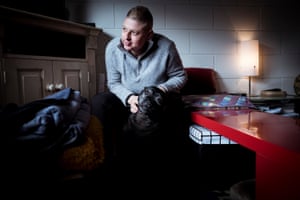
“I now have $9.95 to last me for the next two weeks,” she says over the phone from her home in Geelong.
Carberry has been on Newstart for about three years – the average period of time a person can expect to spend on the payment, according to the government’s own data.
Every month, her bank balance takes a big hit when her car repayments are due. To tide her over, she will get some food and fuel vouchers from the local Vinnies. This week, she will also tell her community housing provider the rent will be late.
“I have to either not pay a bill or access charities for food and things in order to continue to tread water,” she says. “That’s really what it is. It’s treading water. It’s not swimming.”
The car means a lot to her. Carberry bought her Kia Optima a few years ago when she was still employed. That was before the place she worked at went bust and her mum got sick. Things got tough from there.

She moved in with her mother and received a carer’s pension of about $900 a fortnight. When her mother died in 2015, she was put on Newstart. She struggled with the rent and was soon served with a “no grounds” eviction.
Despite some stints in casual work, Carberry has been on the dole ever since. By the end of 2016, she was living in her car. She is desperate to hang on to it now.
She says: “Because it was under finance, I would not have actually ended up with any money for myself to get another vehicle or to do anything with. Whatever the car was sold for, that would have all gone to the finance company with the chance that I would have still owed them money.”
Carberry has a teaching degree and has worked as a security guard. She is a strong advocate for herself and others on Newstart.
Once, after Carberry’s mother had died and she had fallen behind on her payments, the car was repossessed. It was returned after she complained to the ombudsman.
In February, Carberry got a roof over her head through a community housing provider. Her rent is about $150 a week.
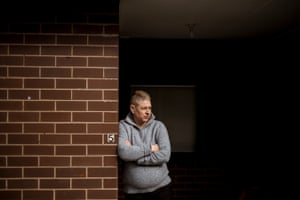
“I’ve been wanting to do it for ages to give myself light in my unit and some privacy,” she says. “So I can have my blinds up and not have everybody see in.
“But I’ve financially suffered for doing that. That has taken months for me to do. I’ve been in here since February.”
Centrelink also deducts $15 a fortnight from her Newstart payments for a Robodebt from 2012. Carberry says she intends to challenge it.
Like about 30% of people on Newstart, she gets rental assistance, but it doesn’t get close to covering her rent. Right now, she is battling an illness – and has been exempted from looking for work since April. She will have surgery soon.
Carberry laughs when she is asked about the last time she treated herself. She nominates the new blinds. There was also some chocolate she got in a hamper brought by Vinnies.
“I can’t go to Starbucks or Gloria Jean’s and just say, ‘Can I have a latte, please?’” she says. “Although I’ve got the health issues, I want to keep my fitness up after my operation.
“I can’t even look at going to the local council pool for a swim.”
There are also her two pets: a dog called Toohey and Phoenix, her cat. She puts a conservative estimate of her actual expenditure on food for the three of them at $60 a week.
When she was living in her car, people sometimes asked why she kept her pets. “And my response to that kind of comment was … ‘Well, these are my children, these are my family. And I am not giving them up,’” she says.
Peter Cooney, 58
Weekly income: $282.25Newstart: $277.85Energy supplement: $4.40
Regular expenses: $213.41 a week
Rent: $120 a week
Storage unit: $41.50 a week (paid monthly)
Welfare debts: $32.50 a week
Court fines: $12.50 a week
Phone: $6.90 a week (paid monthly)
Left with before food: $9.85 a day
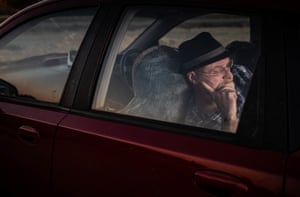
Within 10 months of each other, they had both died. Of a brain haemorrhage and a heart attack.
“They left me with a house that I could no longer afford to rent,” Cooney says. “Eventually I got kicked out of there and I had nowhere to put the furniture.”
Cooney has been unemployed for about a year and is as good as homeless.
Because he had nowhere to go, an ex-partner lets him stay at her place in the suburbs of Perth. He pays about $120 – cheaper than anything he could get in the private market. But it’s a turbulent situation.
“Things haven’t been all that rosy there, so quite a few times I’ll just go sleep in the car,” he says. “There’s a place down in Ocean Reef where the powers that be turn a blind eye.”
Cooney has worked in furniture removal, once managed a hotel in Cairns and, before he quit to care for his mum, he was a brick paver.
“It’s a bit of a young man’s game,” he says. “I rang a paver a while back and he asked how old I was. I said, ‘58’. And he said, ‘You’re joking?’ And that was the end of that.”
Automatic deductions from his Newstart include two welfare debts and some outstanding fines. So he has only $237.47 coming in each week.
“I haven’t been surviving – I’ve sort of been leaning on other people,” he says. “It’s a bit demeaning. You lose a bit of self-respect.”
Cooney is a smoker, pays $30 a month for his phone, and there are also his belongings, which are kept in a storage locker for $180 a month.
He would be happy to ditch the furniture, but he could not stand to give up his books.
“Reading is about the only hobby I’ve got, really,” he says. His only other treat is the occasional beer from Aldi.
“I’ll often just eat once a day,” he says. “I eat a lot of instant noodles, with eggs and some frozen vegies in it. Or a chicken, maybe.”
The diet is a problem because his doctor has already warned him about his arteries: “My father died actually four years older than I am now from a heart attack.”
Recently, his doctor also referred him to a psychiatrist. He thinks he might have ADD. “He gave me two to see – one was $200 and one was $300 for a visit.” He couldn’t go.
Cooney’s priority is finding a place to live. “If I could get enough just to like rent a tiny little place, a room or even one of those portable things that some of the van parks have or something, but you know, you can’t get something for $150,” he says.
“Even in share houses now, people are asking for $150 for a room.”
What does he think about Morrison’s line: “The best form of welfare is a job”?
“Well, I’m quite happy, if they can find me a job, I’d rather be working,” he says. “But unfortunately, with my qualifications and my age, it’s not so easy.”
Aeryn Brown, 35
Weekly income: $285.35Newstart: $277.85Energy supplement: $4.40
Pharmaceutical allowance: $3.10
Regular expenses: $122.65 a weekRent: $69.45 (deducted from Newstart)
Electricity: $10 (deducted from Newstart)
Internet: $15.90 a week (paid monthly)
Phone: $6.90 a week (paid monthly)
Netflix: $2.30 a week (paid monthly)
Home and contents insurance: $8.10 a week (paid monthly)
Opal card: $10 a week
Left with before food: $23.24 a day
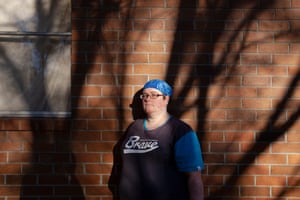
“You just barely survive on this,” she says. “It’s not living, it’s surviving.”
At the end of the fortnight, Brown is not left with much. But she is in public housing near Wollongong and considers herself lucky in that respect. “Sometimes I will be down to $20,” Brown says. “If I have no money, I just stay home and eat what I’ve got in the kitchen, really.”
She watches her bank account “like a hawk”, and when she reels off an itemised list of her spending, it’s obvious she means it.
Internet $69 a month (Brown is looking for a new plan). $10 a week for her Opal card. $30 a month for her phone. $10 on Netflix. Groceries $60 a week.
Brown buys home-brand products, except for pasta sauce because the “home-brand stuff all has onions in it”, which she doesn’t eat. At home, she cooks on Monday and will eat the same food for four days in a row.
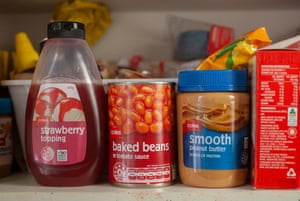
Chocolate milk is an occasional treat. Brown’s last holiday was five years ago for a weekend in Perth. She goes to the movies once or twice a year.
She is studying a certificate three in community services. She’ll take a Cup-a-Soup and a mug for lunch. “I can get boiling water at class.”
When larger expenses come up, it’s a problem. The last time she needed new glasses, Brown had to ask her parents to pay the $200 gap. (They also pay her private health insurance.) “Anything beyond $200 and I’d be screwed,” she says.
Brown has anxiety and depression and so she has now been spared what she calls the “absolutely terrible” Jobactive program. Instead, she is on the disability employment services program and is only required to look for four jobs a month.
She is desperate to work. “It makes me so angry,” she says. “I just want somebody to give me a go.”
Under her mental health plan, she gets 10 free sessions a year with a psychologist.
“That’s bugger-all. I’ll use those up and less than six months,” she says. “Once they’ve gone, they’re gone. I can’t get any more for a year, and I can’t afford to pay.”
If Newstart was increased, she could also buy better food and put more money on her Opal card. Even now, her job search is restricted to places that are close to public transport. She can’t afford to buy a car and she can’t afford lessons to get her licence, anyway.
“I could actually buy stuff because I want them, not because I need them,” she says.
“Like I could buy new clothes because I want them, not because my clothes are wearing out, and I can’t just keep mending them.
“Basically, if my shirts start to fray, I mend it, I sew the hem back up. Holes in my jeans, I patch them. I have a couple pair of jeans and they’re ripped and that’s fine. I don’t buy new unless they’re like really, really, cheap.”
But the difference would not just be material. Money is stress. “It’s stressful because I just don’t have enough of it.”
In Australia, the crisis support service Lifeline is 13 11 14. Other international suicide helplines can be found at www.befrienders.org
No comments:
Post a Comment